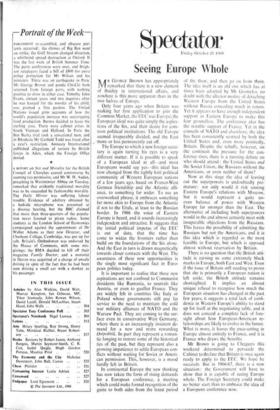Seeing Europe Whole
R GEORGE BROWN has appropriately remarked that there is a new element of fluidity in international affairs, and nowhere is this.more apparent than in the two halves of Europe.
Only four years ago when Britain was making her first application to join the Common Market, the EEC was Europe; the European ideal was quite simply the aspira- tions of the Six, and their desire for com- mon political institutions. The old Europe seemed irreparably divided, and the East more or less permanently cut off.
The Europe to which a new foreign secre- tary is again turning his eyes is a very different matter. If it is possible to speak of a European ideal at all—and most Europeans would say yes—this ideal has now changed from the tightly knit political community of Western European nations of a few years ago, based on Franco-West German friendship and the Atlantic alli- ance, to something far wider. To use an overworked phrase, it embraces something far more akin to Europe from the Atlantic if not to the Urals, at least to the Russian border. In 1966 the voice of Eastern Europe is heard, and it sounds increasingly independent and attractive. It suggests that the initial political impetus of the EEC is out of date, that the time has come to widen the frontiers rather than build on the foundations of the Six alone. And the East in turn is drawn magnetically towards closer contacts with the West. The awareness of these new opportunities is the single most significant fact in Euro- pean politics today.
It is important to realise that these new aspirations are not confined to Communist dissidents like Rumania, to neutrals like Austria, or even to gaullist France. They are widely felt in countries like Italy or Poland whose governments still pay lip service to the need to maintain the cold war military alliances of NATO and the Warsaw Pact. They are coming to the sur- face even in conservative West Germany, where there is an increasingly insistent de- mand for a new and more rewarding Ostpolitik. In part they represent a roman- tic longing to restore some of the historical ties of the past, but they represent also a growing impatience to settle European con- flicts without waiting for Soviet or Ameri- can permission. This, however, is a mood hardly felt in Britain.
In continental Europe the new thinking has now taken the form of rising demands for a European conference, a meeting which could make formal recognition of the gains to both sides from the latest period of the thaw, and then go on from there. The idea itself is an old one which has at times been adopted by Mr Gromyko, no doubt with the ulterior motive of detaching Western Europe from the United States without Russia conceding much in return. Yet it appears to have enough independent support in Eastern Europe to make this fear groundless. The conference also has the notable support of France. Yet in the councils of NATO and elsewhere, the idea has been consistently scorned by both the United States and, even more pointedly, Britain. Despite the rebuffs, however, on the continent the pressure for the con- ference rises; there is a running debate on who should attend : the United States and the Soviet Union, the Russians without the Americans, or even neither of them?
Now at this stage the idea of leaving out the superpowers is undoubtedly pre- mature : not only would it risk souring Eastern Europe's relations with Moscow, but it would represent a quite un- even balance of power with Western Europe far stronger than the East. The alternative of including both superpowers would in the end almost certainly meet with insuperable objections from the Russians. This leaves the possibility of admitting the Russians but not the Americans, and it is this idea which is regarded as the most feasible in Europe, but which is opposed almost without reservation by Britain.
There is no question that the British atti- tude is earning us some extremely black marks in Europe, both East and West. Even if the issue of Britain still needing to prove that she is primarily a European nation is left aside, the British attitude remains shortsighted. It implies an almost unique refusal to recognise how much the European situation has changed in the past few years; it suggests a total lack of confi- dence in Western Europe's ability to stand up for itself at the negotiating table, and it does not conceal a complete lack of fore- sight about how European-American re- lationships are likely to evolve in the future. What is more, it leaves the pace-setting in Europe almost entirely to France, and it is France who draws the benefits.
Mr Brown is going to Chequers this weekend determined to persuade the Cabinet to declare that Britain is once again ready to apply to the EEC. We hope he succeeds. But in 1966-67, there is a new situation: the Government will have to show that it is capable of seeing Europe whole. The Foreign Secretary could make no better start than to embrace the idea of a European conference now.


































 Previous page
Previous page